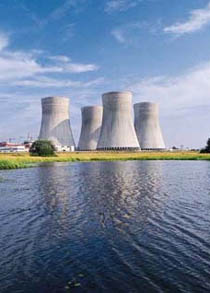
<MZV> supported the approval of Temelín, rejected the Austrian protest</MZV>
 |
Temelín was commissioned after nearly six years of operation on Friday, and the decision took legal effect on Monday. According to the MFA, this anticipated step was preceded by many years of expert cooperation under the constant supervision of the State Office for Nuclear Safety (SÚJB). In connection with the protest letter, the ministry stated that "within the Melk process, both parties have already noted that its objectives have been fulfilled." According to the ministry's spokesperson, the Austrian side was orally informed about the commissioning at Tuesday's meeting of the working group on nuclear energy.
The Austrian parliament may discuss the commissioning at its next meeting on November 29. The ruling People's Party (ÖVP), which had previously hesitated to support similar initiatives, also agreed to jointly promote a resolution calling on the Austrian government to negotiate with Prague regarding Temelín. The Greens called for outgoing Chancellor Wolfgang Schüssel (ÖVP) to travel to Prague immediately. The proposed relevant parliamentary declaration, for example, includes a demand for evidence of the fulfillment of all safety improvements that the Czech Republic committed to in international agreements. The proposal also includes the possibility of filing a lawsuit against Prague if the Czech Republic does not submit the relevant confirmation in a timely manner.
However, according to Franz Leidenmühler, an expert in international law from the University of Linz, the initiation of proceedings against the Czech Republic is very unlikely. The Melk agreement does not contain a clause on mandatory procedures in the event of a dispute, nor any mention of court jurisdiction. Since both parties must agree to the process, he believes the Czech Republic could simply ignore the lawsuit.
Against the commissioning in the Czech Republic, the association South Bohemian Mothers is protesting, which was later joined by the civic association In the Emergency Zone of the Temelín Nuclear Power Plant. "We submitted a request to the South Bohemian regional office for the delivery of the commissioning decision and an appeal against this decision," stated the chairwoman of the South Bohemian Mothers, Monika Machová Wittingerová.
According to the South Bohemian governor, Jan Zahradník, the ministry's decision is clear, and the association can no longer intervene in the process. "Non-governmental organizations that wanted to participate and sought to be parties to this proceeding, and thus have the right to appeal, were excluded from the proceedings by the decision of the Ministry of Regional Development," said the governor. The only party to the proceedings, ČEZ, waived its right to appeal.
According to the Ministry of Industry and Trade, the commissioning of the plant does not mean anything for the future use of nuclear energy in the country. Moreover, the previous operation of the plant, according to the MPO, provided a number of experiences that can be utilized if necessary in new technologies.
The commissioning of Temelín began two years ago. The regional office first issued a decision for the first block at the end of last year. Three civic associations appealed against it to the Ministry of Regional Development. However, according to the ministry, their appeal was unfounded, as they should not have been parties to the proceedings.
According to the Atomic Act, the plant completed its trial operation in the autumn of 2004 when it received permission from SÚJB to switch to full operation. The document permits the operation of Temelín for ten years from the start of the fission reaction. For the first block, this means until 2010, and for the second until 2012. After that, ČEZ will need to obtain new permission.
The investment plan for the construction of a nuclear source in Temelín, which included the construction of four blocks, was issued in February 1979, and the construction of operational facilities began eight years later. In 1990, the government decided to suspend work on the planned third and fourth blocks. The first block of the plant was connected to the grid in December 2000, and the second two years later. Each block of Temelín has an installed capacity of 1000 megawatts.
The English translation is powered by AI tool. Switch to Czech to view the original text source.
0 comments
add comment










